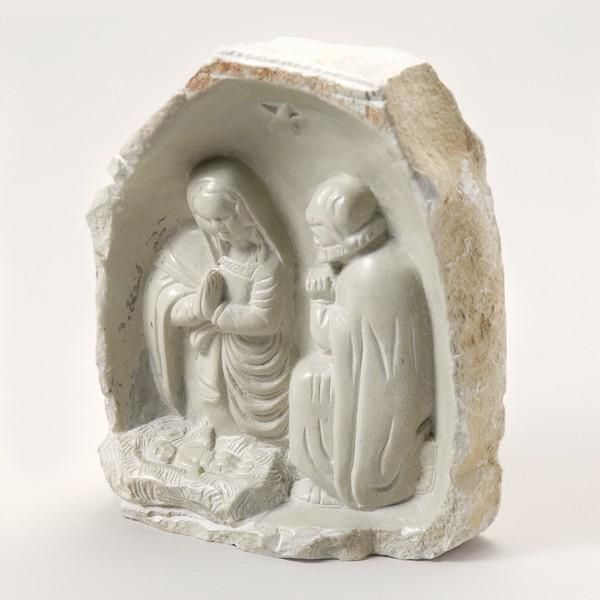Background Passage: Luke 1:26-38; Luke 2:1-52; Matthew 1:20-21, John 3:16-17, Romans 12:2
The Christmas story of the Bible remains one of the world’s most cherished stories for more than one-third of the world’s population. We find a measure of comfort that we are somehow not alone in this world…that God is with us.
I wonder if the story has grown too familiar. Sometimes, it feels as though the luster of God’s amazing gift is dimmed by time and diminished in its telling and retelling. To keep God’s grace gift fresh, I urge you to look beyond the familiar and find…
The Cradle
Crudely cut and hastily made, the innkeeper long ago fashioned a stable from the small cave cut into the limestone behind his home. An afterthought. A casual convenience for travelers who needed a place to livery their animals for an evening.
Within the rocky cave, he chiseled a manger from a protruding slab of rock, hollowing out the stone as a roughly cut and casually built feed trough. The man was no craftsman. He took little time to measure its dimensions or smooth its sides. He left it crude and rough around the edges. A coarse creation, suitable only, it seemed, for one insignificant purpose.
A manger.
A feed trough.
A construction scarcely given a second thought. Invisible to the world around it.
Until this day.
Inside the stable, despite the chill of the evening, a young woman lay drenched in sweat, exhausted by days of travel and hours in labor. Her husband, a young carpenter, paced outside the shelter. Though sympathetic to the pain she bore, like most fathers, he was clueless to its intensity.
He heard a midwife urging one more push. With a guttural groan that made the nervous animals scatter in their stalls and pull against their reins, the woman delivered her son. Tears and laughter comingled with each exhausted breath.
The midwife cleaned the baby as he shivered and cried in the night. The old woman rested the swaddled child upon the mother’s chest. The baby’s cries calmed as he heard the reassuring rhythm of her heart.
While Mary sang a lullaby to her child, Joseph quickly swept the stable of its filth-stained dirt. As he pulled the animal-stained hay from the manger, he noticed its sharp edges. A stone mason and carpenter, Joseph pulled a mallet and chisel from the knapsack. With practiced hands, he smoothed the sharp edges and rough bottom, added new hay and a soft blanket. In the glow of that first Christmas morning, the manger, no longer a rough-hewn feed trough, became a cradle.
In one moment beyond comprehension, God entered his creation as a baby born into a world that had grown as spiritually cold as the cave in which he was born. A world as morally crude as the manger in which he rested.
When filled with God’s love personified in the Christ-child, the unsightly manger became the cradle of Life Abundant, transformed in its purpose by the presence of Emmanuel.
God with us.
Perhaps the manger and its crude construction mirror the mess we’ve made in our lives. We hurriedly chisel our life from the stone, giving little thought to the purpose for which we were created. Whether we live a life of irreverent insurrection or one of unintentional indifference, we find our spiritual edges a little too sharp, a little too crude, a little too rough around the edges. A coarse creation, suitable only, it seems, for insignificant purposes.
Yet, in one miraculous birth, in one divine delivery, God changed everything.
When the manger became a cradle, God came to His world as one of us. To offer himself as the perfect portrait of Godly living.
Because the manger became a cradle, the baby would grow into a savior, to offer himself as a perfect sacrifice for a world that lost its way.
Because the manger became a cradle, Christmas means more than the tinsel and trimmings that the world celebrates.
Because the manger became a cradle, the Christ-Child gives us the chance to turn our empty lives into Life Abundant. God smooths the rough edges and transforms our hearts and our purpose through the constant presence of Emmanuel.
God with us.
Then, to keep God’s grace gift fresh, I urge you to look beyond the cradle and find…
The Child
Born to human parents, but also divine. It is a difficult concept to grasp. Impossible to truly understand. So, we who believe accept it by faith just as his earthly parents did.
Though implanted with God’s DNA, to understand the full measure of what it meant to be Savior did not come instinctively to Jesus. He learned. He learned at the feet of Joseph who surely shared his dream.
“Joseph, son of David, do not be afraid to take Mary home as your wife, because what is conceived in her is from the Holy Spirit. She will give birth to a son and you are to give him the name Jesus, because he will save his people from their sins.” (Matthew 1:20-21)
He learned on the lap of his mother who surely shared the angel’s words.
“Do not be afraid, Mary. You have found favor with God. You will conceive and give birth to a son, and you are to call him Jesus. He will be great and will be called the Son of the Most High. The Lord God will give him the throne of his father David, and he will reign over Jacob’s descendants forever; his kingdom will never end.”
As he grew, he learned from the teachers of God’s word. When he turned 12-years-old, he journeyed to the Temple with his parents. The child immersed himself in his father’s word, failing to join his family for the trip home.
“They found him in the temple courts, sitting among the teachers, listening to them and asking questions…” (Luke 2:46)
Jesus spent time learning more about “his Father’s business.” Eventually, he returned with his parents to Nazareth where “Jesus grew in wisdom and stature and in favor with God and men.” (Luke 2:41-52)
God continued to prepare the child for the purpose for which he was sent. This child, who heard his parents’ stories, who studied scripture with the learned men of his day, constantly felt the tug of God’s voice revealing to him who he was and the purpose for which he was sent. This same child, born in a manger, stood as a man at a wedding feast in Cana, looking into the eyes of his mother telling her, “My hour has not yet come.” This same child read in his mother’s eyes and heard her tell the servants, “Do whatever he tells you.” Her way of saying, “It is time.”
From that day forward, Jesus went about doing his father’s business, drawing others to him, performing miracles and teaching them about repentance and the depth of God’s love…teaching them about grace.
That child from the manger sat in an olive grove answering the probing questions of Nicodemus about the path to eternal life. Jesus surely reflected upon his own birth when he said, “You must be born again.”
That child from the manger told that religious leader that he had come to take on the sins of a world because “God so loved the world, that he gave his one and only son, that whoever believes in him shall not perish but have eternal life. For God did not send his son into the world to condemn the world, but to save the world through him.” (John 3:16-17)
That child in a cradle was God’s grace gift of salvation. The man he grew to be…became a savior.
Understanding our relationship to God and his will for our lives is not implanted naturally into our DNA just because we are born to Christian parents or attend church regularly. Our understanding of what God requires of us comes from listening to God’s spirit and following Jesus’ lead.
We learn. We grow. We spend time sitting among the teachers, studying scripture and asking questions with a heart’s desire to grow in wisdom and stature and in favor with God and men…just as Jesus did. We see the child in the cradle and are reminded that God loved us so much that he sent his son to save us and the world around us through him.
Then, to keep God’s grace gift fresh this Christmas, I urge you to look beyond the cradle, see the savior and commit to…
The Change
As Christians, we get pulled into the celebration of the Christmas holiday. We delight in the lights, the decorations and the excited faces of the children opening Santa’s presents. We enjoy our parties with friends and visits with our extended families. It’s easy to be lost in the business and busyness of Christmas.
Those of us who celebrate the birth of Jesus ought to reflect upon its meaning, using the day as a reminder of God’s plan and purpose to bring the world back into relationship with him by sending is Son. It is far too easy for many of us to revel in the birth of the child and forget that God expects more from us.
What do we do after we read that beautiful story for the last time this year? After we snuff out the Advent candles? After we sing the last carol? After we dismantle the Nativity scenes? What do we do after we celebrate the birth of the Christ child? What do we do when Christmas is over? What change does it bring to our lives?
You see, the Christmas story does not end with the birth of Jesus. It doesn’t even end with his death and resurrection. Once the baby is born and a savior’s act complete, the story and its impact should serve as a catalyst for God to change our lives.
Christmas is a reminder that God will work in our lives, but only to the extent that we allow him. Christmas must change our hearts and our minds, not just on the surface, but from the inside out.
Though he didn’t celebrate Christmas as we do, the Apostle Paul would be the first to tell you about being changed. In a blinding revelation on the road to Damascus, he saw before him God’s plan of redemption evidenced in the life of Christ…from his birth to his resurrection and his ever-present spirit. It was a life-changing encounter. It’s one reason he could encourage the Christians in Rome to set aside the ways of the world for the life Christ offers.
“Do not conform to the pattern of the world but be transformed by the renewing of your mind. Then you will be able to test and approve what God’s will is—his good, pleasing and perfect will. (Romans 12:2)
You see, Christmas is just a holiday unless we let God chisel away the rough edges of our lives to make our hearts a comfortable place for the Christ child to rest. It is just a holiday unless we see Jesus as more than a baby in a manger and accept him as a savior and Lord. Christmas is just a holiday unless we allow the child who became savior to transform our hearts and minds in such a way that we are ever obedient to his will in all things.
“You shall call him Jesus, Emmanuel…God with us.”
That’s Christmas to me.


